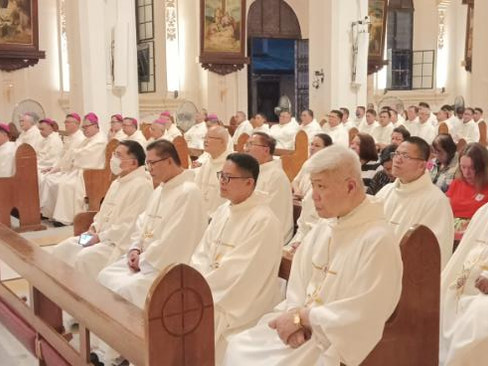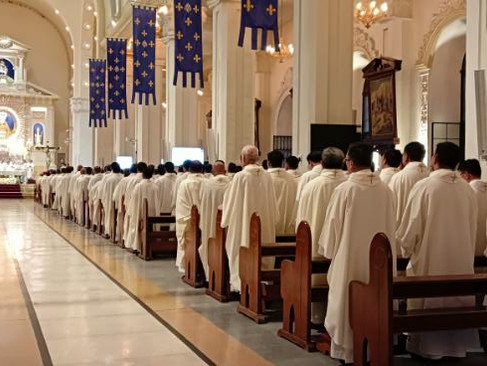Sacred Space Leads to Safe Spaces
- Dominus Est

- Oct 23, 2025
- 6 min read
Homily of H.E., Most Rev. Joel Z. Baylon, D.D. (Bishop of Legazpi)
Opening Mass – 2025 National Safeguarding Conference*
October 20, 2025 | Holy Rosary Parish, Angeles City
Theme: “Our Mission of Safeguarding: A Journey of Hope and Compassion”
Your Excellency, Most Rev. Florentino G. Lavarias, D.D., Archbishop of San Fernando, Pampanga and Chairman of the Office on the Protection of Minors of the Catholic Bishops' Conference of the Philippines (CBCP); Your Excellency, Bishop Luis Manuel Alí Herrera, Auxiliary Bishop of Bogotá, Colombia, Secretary of the Pontifical Commission for the Protection of Minors; your excellencies, reverend fathers, reverend sisters, brothers and sisters in the Lord, collaborators in the safeguarding ministry and protection our beloved minors and vulnerable adults:
Good evening po! Magandang, gabi sa inyong lahat!

Photos by Father (LTC) Dionesio L. Acaso CHS (GSC).
Our readings today invite us to reflect on two profound realities at the heart of our Christian calling, the sacred duty to protect the vulnerable, and the compassionate call to accompany those who have gone astray. Both are rooted in the very same Divine command to love as God loves.
The Sacred Space in Our Hearts
In the First Reading, from the Book of Deuteronomy 30:10-14, Moses speaks to the people of Israel as they were about to enter the promised land, with these words, “This command that I give you today is not too mysterious or remote for you. It is something very near to you, already in your mouths and in your hearts. You only have to carry it out.” Moses is reminding the people that God's Law, God's way, is not something far away, written only on stone tablets or confined to religious structures. It is written in the human heart (cf. Jer. 31:33). It is the law of love, of justice, of compassion.
If we truly listen to the voice of God within us, we will always be moved to protect life, to defend the innocent, and to restore what has been broken.
If we constantly say that we need to provide safe spaces to our children, it is important that we realize that the first safe space is the sacred space that we provide for God to speak to us.
Sacred space leads to safe spaces.
In our own time, the Church continues to face the painful reality of abuse and betrayal of trust, especially against children and vulnerable adults. These wounds run deep. They have scared hearts, shaken faith, and challenge the very credibility of our witness.
Safeguarding, which we are about [to do] these days, the proactive care and protection of those entrusted to us is not simply a policy or an institutional requirement. It is a gospel imperative. It is the living out of the commandment that Moses spoke of, “already written in our hearts” by the very spirit of God, who is in us.
When Jesus says in the Gospel of Matthew 18:15-20, “If your brother sins against you, go and tell him his fault between you and him alone,” He is not encouraging confrontation for its own sake. Rather, He is calling for a community of accountability, of truth, spoken in love.
Safeguarding begins precisely here: in honesty, transparency, and the courage to face wrongdoing, not to condemn, but to heal. To protect children and vulnerable adults is to honor the presence of Christ Himself, who said, “Whoever welcomes one such child in my name welcomes me” (cf. Mark 9:37).
Every act of care, every policy that ensures safety, every heart that listens to the pain of victims and survivors, these are sacred acts of worship.
Justice and Mercy
However, our Gospel also invites us to hold together two dimensions that can seem difficult to balance: justice on one end, and mercy on the other. Accountability on this end, and compassion on this other end. Jesus outlines a process for dealing with those who have sinned. A process that moves from personal correction to communal discernment. The aim is always restoration, not humiliation. The Church's task, then, is not only to protect, but also to heal; not only to call out sin, but also to call for conversion.
This applies even to those among us who have failed gravely: our erring brothers and sisters, including particularly clerics who have betrayed their sacred vows, and have hurt others. While we must never excuse or minimize the harm they have caused, we are also called to accompany them with the same compassion that Jesus showed to the woman caught in adultery (John 8:1-11), to Peter after his denial (John 21:15-19), and to Zacchaeus, who turned his life around (Luke 19:1-10).
Accountability and Compassion
Accountability and compassion are not opposite. They are two hands of the same body of Christ. One hand protects the vulnerable, the other seeks to heal the sinner. Together, they form the posture of a Church that looks exactly like Jesus, firm in truth, yet overflowing with mercy.
Moses' words ring true for us today, “The word is very near you.” Safeguarding is not an external demand imposed upon the Church; it is an inner call that comes from the heart of the gospel.
Every time we ensure that our parishes, schools, and communities are safe spaces for children and the vulnerable, we are saying “yes” to God’s word already written in our hearts. When we accompany an erring cleric or a wounded believer, not by ignoring their sin, but by walking with them towards repentance and healing, we are also saying “yes” to the God whose mercy restores and transforms. Both safeguarding and accompaniment flow from the same Divine source. A love that protects, a love that redeems.
Safeguarding as a Way of Life
If we take today's reading seriously, even as we begin this National Safeguarding Conference, then safeguarding is not merely a program, it is a culture, a way of life. It is a way of being Church. It means forming consciences, nurturing empathy, listening deeply to stories of pain, and empowering every member of the community: lay and ordained, to be guardians of one another's dignity.
It also means never growing tired of building structures of accountability, transparency, and formation. For in every generation, the Church must rediscover the nearness of God's word, calling us not to complacency, but to continued conversion.
For those who have heard, including members of the clergy who have fallen short, our task is to accompany them toward truth and repentance; not to hide them, but to help them face the light of Christ.
To accompany is not to condone. It is to believe that no one is beyond the reach of God's mercy.
Jesus ends today's Gospel with a promise, “Where two or three are gathered together in my name, there am I in the midst of them” (Matthew 18:20). This promise gives us hope. When we gather to protect the vulnerable, to seek justice, to walk with the wounded and the penitent alike, Christ Himself is there. He is present in the tears of the survivors, in the courage of those who speak the truth, in the humility of those who repent, and in the steadfast compassion of those who accompany.
Christ's presence transforms our efforts from mere human work into sacred mission. It is He who heals, He who restores, He who makes all things new.
Final Exhortations
My dear brothers and sisters: safeguarding is not only about preventing harm; it is also about revealing the very heart of God. It is about creating communities where love is stronger than fear, truth is stronger than denial, and mercy stronger than shame.
Let us listen to that Word which is very near to us, in our hearts, in our consciences, in the cries of those who have suffered, and in the quiet voice of the Spirit calling us all to conversion.
May we be a Church that protects with courage, heals with tenderness, and accompanies with the mercy of Christ.
May every child, every vulnerable person, every wounded sinner, find in us not judgment or indifference, but the face of the Good Shepherd, who came not to condemn but to save (John 3:17; 10:10).

Photo by Jet Sagun.
_________________________________
*A three-day international gathering that brings together Church leaders, safeguarding experts, and advocates to deepen our shared mission of protecting human dignity and ensuring the safety of the most vulnerable.
Transcribed by Joel V. Ocampo









Comments